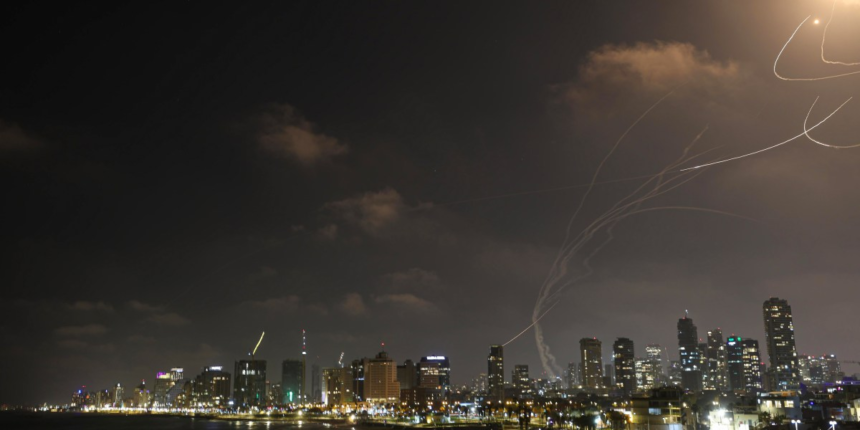Iran retaliated late Friday by unleashing scores of ballistic missiles on Israel, where explosions flared in the skies over Jerusalem and Tel Aviv and shook the buildings below.
“We will not allow them to escape safely from this great crime they committed,” Iran’s Supreme Leader Ayatollah Ali Khamenei said in a recorded message in which he vowed revenge. Iran’s U.N. ambassador said 78 people were killed and more than 320 wounded in Israeli attacks.
Israel’s paramedic services said 34 people were wounded in the barrage on the Tel Aviv area, including a woman who was critically injured after being trapped under rubble. In Ramat Gan, east of Tel Aviv, an Associated Press journalist saw burned out cars and at least three damaged houses, including one where the front was nearly entirely torn away.
U.S. ground-based air defense systems in the region were helping to shoot down Iranian missiles, said a U.S. official who spoke on condition of anonymity to discuss the measures.
Israel had long threatened such a strike, and successive American administrations sought to prevent it, fearing it would ignite a wider conflict across the Middle East and possibly be ineffective at destroying Iran’s dispersed and hardened nuclear program.
Countries in the region condemned Israel’s attack, while leaders around the globe called for immediate deescalation from both sides.
The U.N. Security Council scheduled an emergency meeting for Friday afternoon at Iran’s request. In a letter to the council, Iran’s Foreign Minister Abbas Araghchi called the killing of its officials and scientists “state terrorism” and affirmed his country’s right to self-defense.
Israel’s military said about 200 aircraft were involved in the initial attack on about 100 targets. Its Mossad spy agency positioned explosive drones and precision weapons inside Iran ahead of time, and used them to target Iranian air defenses and missile launchers near Tehran, according to two security officials who spoke on condition of anonymity.
It was not possible to independently confirm the officials’ claims.
Israel said it struck a nuclear research facility in Isfahan, too, and said it destroyed dozens of radar installations and surface-to-air missile launchers in western Iran. Iran confirmed the strike at Isfahan.
Israel military spokesman Brig. Gen. Effie Defrin said the Natanz facility was “significantly damaged” and that the operation was “still in the beginning.”
U.N. nuclear chief Rafael Grossi told the Security Council that the above-ground section of the Natanz facility was destroyed. He said all the electrical infrastructure and emergency power generators were destroyed, as well as a section of the facility where uranium was enriched up to 60%.
The main centrifuge facility underground did not appear to have been hit, but the loss of power could have damaged the infrastructure there, he said.
The first wave of strikes had given Israel “significant freedom of movement” in Iran’s skies, clearing the way for further attacks, according to an Israeli military official who spoke on condition of anonymity because he was not authorized to discuss details of the attack with the media.
The official said Israel is prepared for an operation that could last up to two weeks, but that there was no firm timeline.
Iran confirmed all three deaths, significant blows its governing theocracy that will complicate efforts to retaliate. Khamenei said other top military officials and scientists were also killed.
Netanyahu said the attack had been months in the making. In a video statement sent to journalists Friday, he said he ordered plans for the attack last November, soon after the killing of Hassan Nasrallah, the leader of Hezbollah in Lebanon, one of Iran’s strongest proxies. Netanyahu said the attack was planned for April but was postponed.
In its first response Friday, Iran fired more than 100 drones at Israel. Israel said the drones were being intercepted outside its airspace, and it was not immediately clear whether any got through.
Israel’s military said it called up reservists and began stationing troops throughout the country as it braced for further retaliation from Iran or Iranian proxy groups.
Trump urged Iran on Friday to reach a deal with the U.S. on its nuclear program, warning on his Truth Social platform that Israel’s attacks “will only get worse.”
“Iran must make a deal, before there is nothing left, and save what was once known as the Iranian Empire,” he wrote.
Officials in Washington had cautioned Israel against an attack earlier in the week, so as not to disrupt U.S. negotiations with Iran over its nuclear enrichment program. They stressed Friday that the U.S. had not been involved in the attack, and warned against any retaliation targeting U.S. interests or personnel.
Israeli leaders cast the attack as necessary to head off an imminent threat that Iran would build nuclear bombs, though it remains unclear how close the country is to achieving that or whether Iran had actually been planning a strike. Iran maintains its nuclear program is for civilian purposes only.
Israel is widely believed to be the only nuclear-armed state in the Middle East but has never acknowledged having such weapons.
On Friday, Israelis rushed to supermarkets in Tel Aviv, Jerusalem and elsewhere to buy bottled water and other supplies. But, otherwise, streets and parks were mostly deserted.
There is a broad consensus in the Israeli public that Iran is a major threat, and Israel’s opposition leader, Yair Lapid, a staunch critic of Netanyahu, offered his “full support” for the mission against Iran. But if Iranian reprisals cause heavy Israeli casualties or major disruptions to daily life, public opinion could shift quickly.
Khamenei, the Iranian supreme leader, said in a statement that Israel “opened its wicked and blood-stained hand to a crime in our beloved country, revealing its malicious nature more than ever by striking residential centers.”
Netanyahu expressed hope the attacks would trigger the downfall of Iran’s theocracy, saying his message to the Iranian people was that the fight was not with them, but with the “brutal dictatorship that has oppressed you for 46 years.”









